Accepting Oscar, Glazer says don’t use our Jewishness and Holocaust to justify Gaza war
Director of award-winning ‘The Zone of Interest’ Holocaust movie laments ‘occupation,’ ‘dehumanization’ in Israel and Gaza; several celebs wear pins calling for ceasefire.
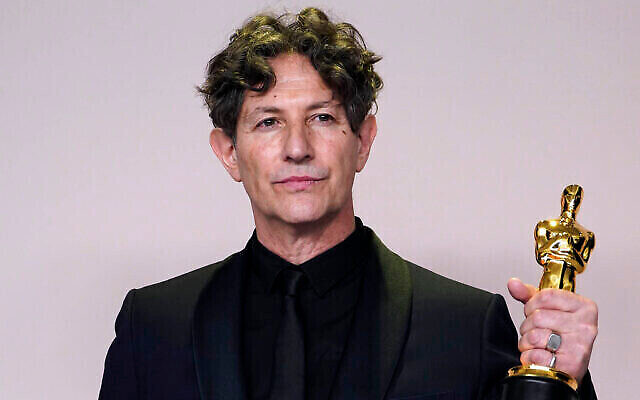
(THE TIMES OF ISRAEL) As widely predicted, “Oppenheimer,” the biopic of Jewish nuclear physicist J. Robert Oppenheimer, swept a number of categories at Sunday’s Oscars, including best picture, in a year unusually heavy with Jewish nominees.
But the most talked-about Jewish moment of the night came courtesy of Jonathan Glazer, writer-director of the cerebral Holocaust drama “The Zone of Interest,” who used his acceptance speech to comment on the Israel-Hamas war.
Standing alongside producers James Wilson and Len Blavatnik during his acceptance speech for best international feature, Glazer, who is Jewish and came to Israel on a five-month program when a student at London’s Jewish Free School, denounced Israel’s occupation of Palestinian territory, which he said had led to “dehumanization” that had affected both Israelis and Palestinians.
“Our film shows where dehumanization leads at its worst. It’s shaped all of our past and present,” Glazer said.
“Right now we stand here as men who refute their Jewishness and the Holocaust being hijacked by an occupation which has led to conflict for so many innocent people, whether the victims of October the 7th in Israel or the ongoing attack on Gaza,” he added to applause and cheers.
“All the victims of this dehumanization. How do we resist?” he said, to more applause.
Glazer’s reference to Israel’s war in Gaza came after pro-Palestinian protesters snarled traffic around the Dolby Theatre as the Oscars kicked off.
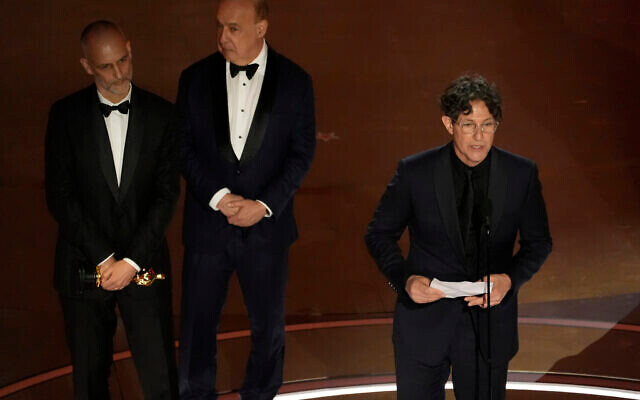
In a previous award acceptance speech last month, Wilson criticized “innocent people being killed in Gaza” as something people should face head-on, rather than from behind “the walls we construct in our lives which we choose not to look behind,” in an allusion to the film’s depiction of Nazis and their families as willfully ignorant of the murder of Jews just beyond their gardens.
Blavatnik, meanwhile, is one of several major donors to suspend their support for Harvard University over its response to Hamas’s atrocities on October 7.
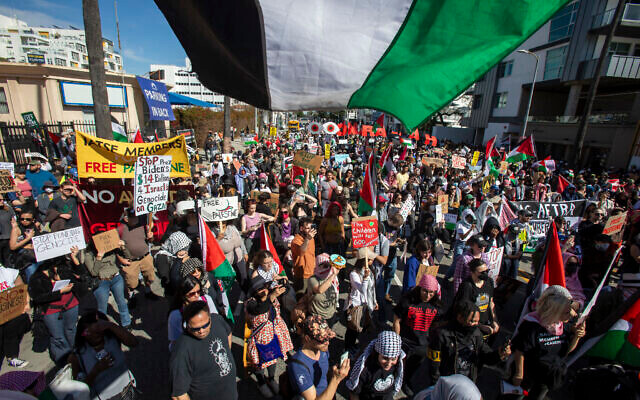
Glazer’s comments elicited a range of reactions, including kudos from critics of Israel who mistakenly thought he had called Israel’s actions in Gaza “a holocaust” and castigation from prominent Jewish voices who misinterpreted his comments as saying that he was rejecting his own Jewish identity, rather than rejecting the use of the Holocaust to justify the “occupation.”
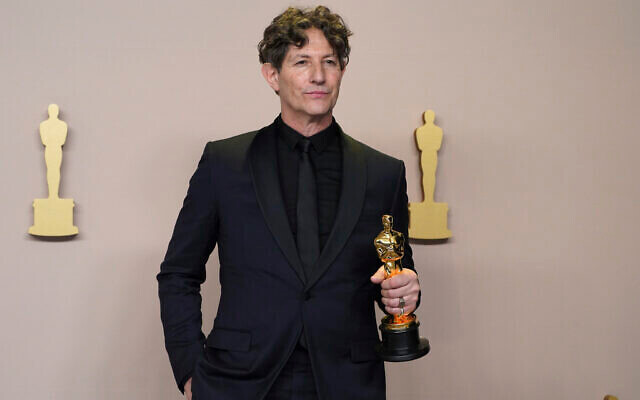
A founder of IfNotNow, a far-left Jewish group that has accused Israel of “genocide” and called for a ceasefire, said Glazer’s speech offered evidence of growing dissent against Israel among Jews. “More and more Jews are making clear that their Jewish values lead them to speak out against Israel,” Yonah Liberman tweeted.
Glazer, who was the first person to mention the conflict on stage, concluded by dedicating his Oscar to a real-life Polish resistance fighter whose story was featured in the film. He did not specifically call for a ceasefire in the Israel-Hamas war.
But a range of celebrities at the awards show — including musician Billie Eilish; director Ava DuVernay; and actors Mark Ruffalo, Mahershala Ali, and Ramy Youssef — wore red pins supporting a ceasefire, in what is seen as a show of support for Palestinians.
“It’s really inspiring that so many artists here have been down for the cause and are wearing these pins,” said Youssef, who is Arab-American and a leader of the Artists for Ceasefire movement, on the red carpet before the show. (Youssef traveled to Israel to film his recent autobiographical show.)

In a statement, Artists for Ceasefire said it was urging US President Joe Biden and Congress to “call for an immediate de-escalation and ceasefire in Gaza and Israel before another life is lost.”
It appealed for “an end to the bombing of Gaza, and the safe release of hostages.”
The statement mentioned that “more than 30,000 people have been killed over the last 5 months” – quoting the unverified toll from the Hamas-controlled Gaza health ministry that does not distinguish between fighters and non-combatant civilians. It also included an assessment that a child “is being killed every ten minutes in Gaza,” and cited UNICEF in describing the dire humanitarian crisis in Gaza where aid supplies have been drastically curtailed during the fighting.
The statement made no specific mention of the event that led to the war: the Palestinian terror group Hamas’s devastating October 7 attack on Israel that killed 1,200 people, mostly civilians, amid horrific atrocities including widespread gang rape, torture, and mutilation of victims, among them children. The thousands of attackers who burst into Israel from Gaza that day also abducted 253 people of all ages who were taken as hostages in the Palestinian enclave.
Israel responded to the attack with a military campaign to topple the Gaza regime in Gaza, destroy the terror group, and free the hostages of whom over half are still being held captive, dozens of them believed no longer alive.
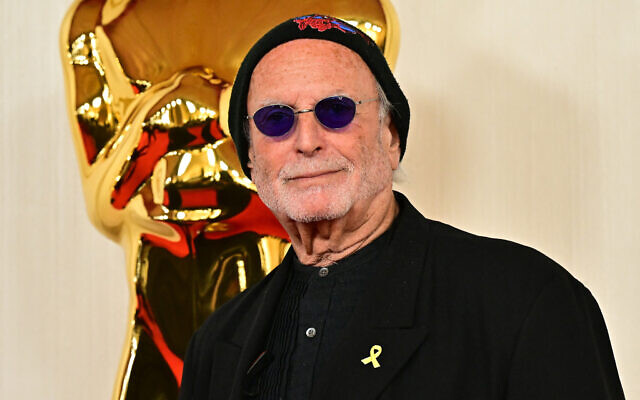
According to a BBC tally, only Israeli-American film producer Avi Arad was seen wearing a yellow ribbon pin to show solidarity with the hostages.
The pins, sponsored by Bring Them Home, an Israeli hostages advocacy group, have shown up on the chests of a handful of other celebrities at previous events. J Smith-Cameron and John Ortiz both wore a yellow ribbon pin at the Golden Globes earlier this year.
Milo Machado-Graner and Swann Arlaud, stars of “Anatomy of a Fall,” both wore Palestinian flag pins at the Oscars.
Meanwhile, a commercial funded by Robert Kraft to raise awareness of antisemitism also aired during the ceremony.
However, the plight of hostages did get a personal shout-out at Elton John’s party for the Oscars in Los Angeles with freed hostage Mia Schem attending the event. Schem was kidnapped on October 7 from the Supernova desert rave, where Hamas terrorists massacred 364 people.
Schem wore a white gown decorated with an oversized yellow rhinestone ribbon pin to raise awareness of the hostages still in Gaza, as she attended the annual 32nd Elton John AIDS Foundation Academy Awards Viewing Party.
Schem, a tattoo artist, was still wearing a full cast on her right arm, where she was shot during the Hamas attack. She underwent surgery while being held in Gaza, and was freed during a weeklong truce in November.
Schem, her mother, and brother are in the US to speak about the remaining hostages, visiting New York, Toronto, and Washington, DC, where she attended US President Joe Biden’s State of the Union address.

The winningest film of the night was “Oppenheimer,” based on the life of the “father of the atomic bomb,” which took home eight awards in total, including for Christopher Nolan for best director. Also scoring wins for the film were lead actor Cillian Murphy and supporting actor Robert Downey Jr., the latter for playing Oppenheimer’s real-life Jewish political rival, Lewis Strauss. The film features a great deal of discussion about its subject’s Judaism, including his efforts to recruit Jewish scientists exiled from Nazi-occupied Europe.
“Oppenheimer” and “The Zone of Interest” were two of an unusually large crop of Jewish nominees this year. Also competing in the best picture category were “Barbie,” the megahit musical comedy that incorporates the real-life doll’s Jewish inventor Ruth Handler (it won one Oscar, for best song), and “Maestro,” Bradley Cooper’s biopic of Jewish conductor-composer Leonard Bernstein (which stirred controversy with its makeup but went home empty-handed).
In addition to best international feature, “The Zone of Interest” also won the Oscar for best sound. The film’s unnerving approach to sound design spliced the noise of the unseen Auschwitz death camps onto the soundtrack while foregrounding the lives of the Nazi family whose patriarch was charged with overseeing it.
A handful of Jewish winners emerged from the evening as well. One was Arthur Harari, the co-writer of French best-picture nominee “Anatomy of a Fall,” who won for best original screenplay alongside his life and writing partner, Justine Triet. Harari has Mizrahi ancestry. Members of that film’s creative team wore Palestinian flag pins to the show.

comments